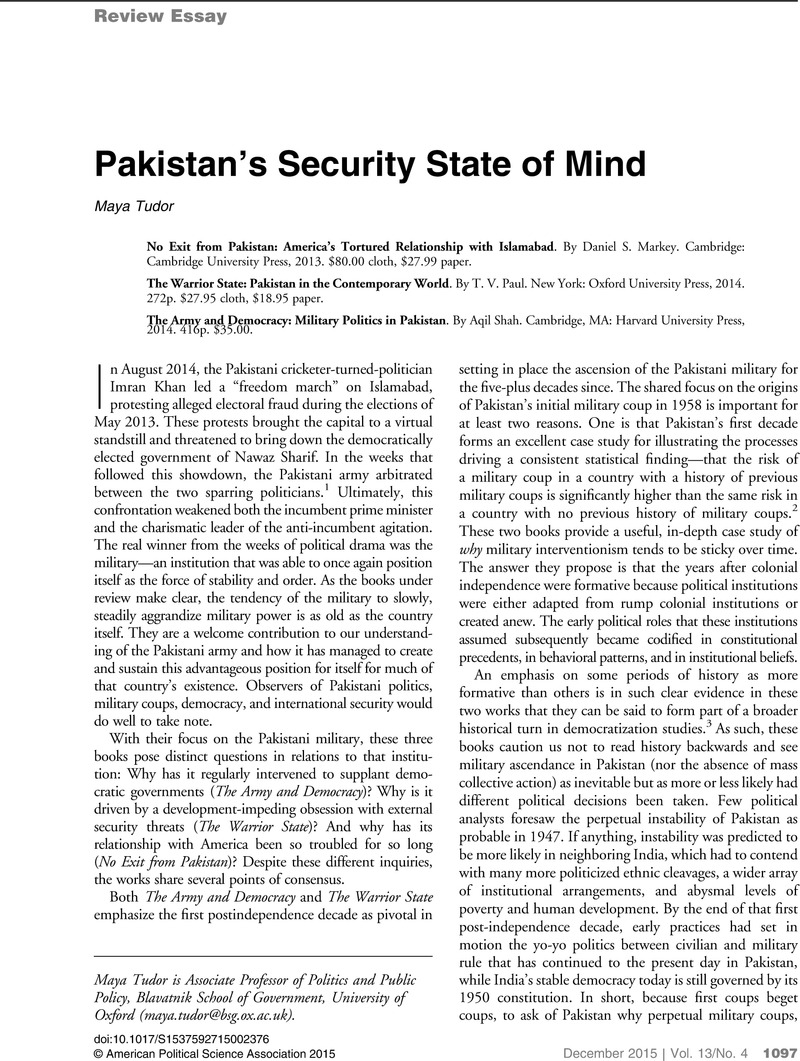No CrossRef data available.
Article contents
Pakistan’s Security State of Mind
Review products
No Exit from Pakistan: America’s Tortured Relationship with Islamabad. By MarkeyDaniel S.. Cambridge: Cambridge University Press, 2013. $80.00 cloth, $27.99 paper.
The Warrior State: Pakistan in the Contemporary World. By PaulT. V.. New York: Oxford University Press, 2014. 272p. $27.95 cloth, $18.95 paper.
The Army and Democracy: Military Politics in Pakistan. By ShahAqil. Cambridge, MA: Harvard University Press, 2014. 416p. $35.00.
Published online by Cambridge University Press: 15 December 2015
Abstract
An abstract is not available for this content so a preview has been provided. Please use the Get access link above for information on how to access this content.

- Type
- Review Essays
- Information
- Copyright
- Copyright © American Political Science Association 2015
References
Bermeo, Nancy. 1992. “Democracy and the Lessons of Dictatorship.” Comparative Politics 24(3): 273–91.CrossRefGoogle Scholar
Capoccia, Giovanni and Ziblatt, Daniel. 2010. “The Historical Turn in Democratization Studies: A New Research Agenda for Europe and Beyond.” Comparative Political Studies 43(8): 1119–47.CrossRefGoogle Scholar
Hamid, Mohsin. 2011. “Why They Get Pakistan Wrong.” New York Review of Books. http://www.nybooks.com/articles/archives/2011/sep/29/why-they-get-pakistan-wrong/ (accessed November 24, 2014).Google Scholar
Huntington, Samuel. 1968. Political Order in Changing Societies. New Haven: Yale University Press.Google Scholar
Keck, Margaret and Sikkink, Kathryn. 1998. Activists Beyond Borders: Advocacy Networks in International Politics. Ithaca, NY: Cornell University Press.Google Scholar
Londregan, John and Poole, Kenneth. 1990. “Poverty, The Coup Trap, and the Seizure of Executive Power.” World Politics 42(2): 151–83.CrossRefGoogle Scholar
Migdal, Joel. 2001. State in Society: Studying How States and Societies Transform and Constitute One Another. Cambridge: Cambridge University Press.CrossRefGoogle Scholar
New Delhi Television. 2014. “Pakistani Army Chief Mediates.” http://www.ndtv.com/article/world/pakistan-army-chief-mediates-meets-imran-khan-cleric-tahir-ul-qadri-583463 (accessed October 23, 2014).Google Scholar
Potter, David. 1986. India's Political Administrators, 1919–1983. Oxford: Clarendon Press.Google Scholar
Raghavan, Srinath. 2012. “Soldiers, Statesmen, and India’s Security Policy.” India Review 11(2): 116–33.CrossRefGoogle Scholar
Tudor, Maya. 2013a. The Promise of Power: The Origins of Democracy in India and Autocracy in Pakistan. New York: Cambridge University Press.CrossRefGoogle Scholar
Tudor, Maya. 2013b. “Explaining Democracy’s Origins: Lessons from South Asia.” Comparative Politics 45(3): 253–72.CrossRefGoogle Scholar
Tudor, Maya. 2014. “Renewed Hope in Pakistan?” Journal of Democracy 25(2): 105–18.CrossRefGoogle Scholar




